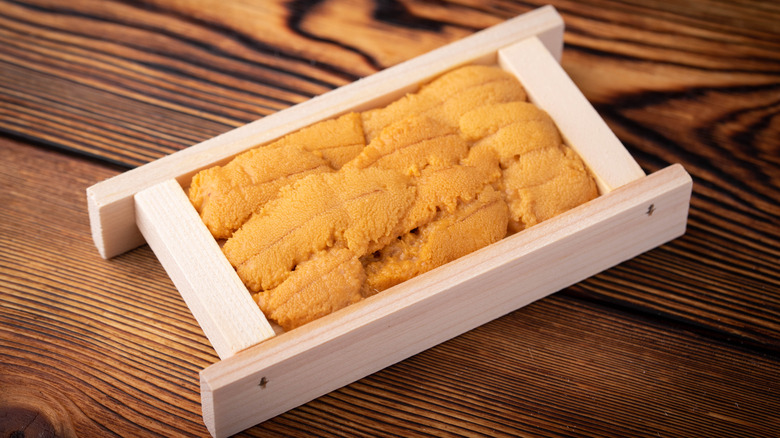The Chemical Used To Preserve Uni And What's Replacing It
You may consider yourself a seafood lover if you love slurping down salty oysters, cracking into freshly-caught lobster, or find yourself enjoying all-you-can-eat sushi restaurants. However, we believe you can't truly call yourself a real seafood connoisseur until you've experienced one of the best ocean-caught, melt-in-your-mouth delicacies out there: uni.
Uni is sea urchin roe, as Gourmet Food Store explains, and it is a global luxury. The site describes this seafood as savory with an ocean-infused flavor. Its bright orange or golden yellow color is stunning, so it makes a great aesthetic addition to any sushi platter.
For uni lovers, it may be surprising to learn that boxed uni is often preferred over eating fresh-caught or live uni. According to the Michelin Guide, if you choose fresh uni, you have to crack open the spiky shell and remove the uni yourself, while uni in boxes come already prepared and ready for you to eat. They may even have a better flavor thanks to the preservative it's treated with, but only for a certain amount of time.
Alum keeps uni tasting fresh, until it doesn't
Prepackaged uni in Japan often contains alum, according to La Petit Noisette. Alum is a chemical that can come in the form of various compounds that are "hydrated sulfate salts of aluminum and usually one other metal," (via Thought Co.). Alum has many useful culinary purposes, and it can be used in anything from pickling to acting as a water purifier.
However, in the case of uni, it is used to help the seafood keep its shape. This technique works really well, but only for a certain amount of time. Eventually, it will develop an unappetizing metallic flavor and the uni will start to take on a strong "fishy" taste.
Since uni is considered a delicacy, some have turned to other methods to protect its unique flavor. For instance, storing the uni in brine is another great preservation option. The brine can simply be made of water and salt, according to Gourmet Food Store.
Particularly, a brine that has been "deoxygenated and enriched with nitrogen" is useful, as per La Petit Noisette. It is great at keeping the uni fresh without producing distasteful flavors down the line. So, make sure to read the box the next time you order some boxed uni.

